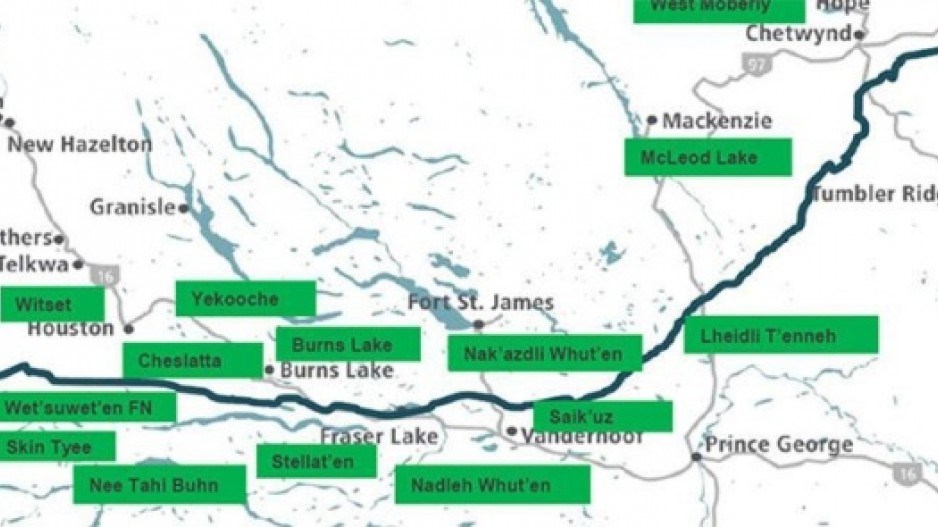By Mark Nielsen
A temporary injunction prohibiting opponents of the $6.2-billion Coastal GasLink natural gas pipeline project from blockading a bridge was expanded Friday to cover two entire forest service roads.
Coastal GasLink had applied for the amendment after a process server hired by the company encountered a blockade further up the Morice Forest Service Road on Tuesday while on the way to post the original order at the bridge.
Members of the Unist'ot'en, a clan within the Wet'suwet'en system of hereditary chiefs, have been maintaining the blockade at the bridge as well as a camp about a kilometre away since about 2012. The injunction would not affect the camp, Coastal GasLink has stressed.
The neighbouring Gitdumden clan had put up the latest blockade, according to a statement from the Wet'suwet'en Hereditary Chiefs.
The new order, approved by B.C. Supreme Court Justice Marguerite Church after hearing submissions from Coastal GasLink lawyer Kevin O'Callaghan during a brief hearing at the Prince George courthouse, also applies to the Morice West Forest Service Road.
The process server encountered a school bus blocking a one-lane bridge on the Morice Service Road about 45 kilometres south of Houston, O'Callaghan said in an application seeking the revised order.
"Beyond the school bus, there were vehicles, a structure and several pieces of wood which had been placed at or near the Morice West Forest Service Road at its intersection with the Morice Forest Service Road.
It's the latest development in something of a cat-and-mouse game between Coastal GasLink and the Wet'suwet'en Hereditary Chiefs.
All five elected band councils within the Wet'suwet'en First Nation are onside with the project to construct the 670-kilometre pipeline that would deliver natural gas to the fledgling LNG Canada project near Kitimat from a station at Groundbirch west of Dawson Creek. Combined, the cost of the pipeline and LNG plant adds up to $40 billion.
The company has reached a series of benefit agreements with 20 elected bands along the project route including those of the Wet'suwet'en, amounting to hundreds of millions of dollars.
However, the Wet'suwet'en Hereditary Chiefs say they have never consented to the project, although at least one heriditary chief has reportedly spoken in favour.
The company wants to begin pre-construction work - field reconnaissance, access development, clearing, grading and construction of a work camp - starting Jan. 2 saying a small delay could contribute to a significant overall delay further along. $24 million in contracts and 87,000 in employment is at stake if the initial work is not able to go ahead, the company has also said.
The injunction, which came into effect on Monday, is to last until May 31, 2019 in order to give the defendants enough time to provide a fuller response to Coastal GasLink's application for a permanent injunction while also allowing the company to carry out the pre-construction work.
Once that phase is completed, the company won't return to the disputed site until June 2021.
The order was also amended to allow Coastal GasLink to simply post the order on its website and provides for an alternative method to serve the order on the named defendants, Freda Huson and Warner Naziel, should they no longer have counsel.
The defendants' lawyer, Michael Ross, took no position on Coastal GasLink's application.
Also at play is a jurisdictional challenge over whether the project is inter-provincial so, should also be reviewed by the National Energy Board.
To that end, the NEB is scheduling hearings over the next three months, saying it will consider only the question of whether the British Columbia Oil and Gas Commission had jurisdiction to issue approvals for the project.
If it decides the project should be under federal jurisdiction, the regulator says the proponent will have to make a formal NEB application and undergo a separate process to win federal approval.
"If the NEB decides Coastal GasLink is to be federally regulated, then the project believes the NEB will need to address transition from provincial to federal jurisdiction," pipeline spokeswoman Jacquelynn Benson said in an email on last week.
"If that situation occurs, Coastal GasLink will review that decision to determine its path forward."
The NEB actions are in response to a challenge by B.C. resident Mike Sawyer who argues that because TransCanada Corp. will own and operate the proposed pipeline and its connected Nova Gas Transmission Ltd. system together, they form a single system that crosses the Alberta-B.C. boundary and therefore must be regulated by the federal government.
The NEB says on its website it will accept additional written evidence from the builder late this month, take written evidence from interveners in January and gather information requests and responses from parties in January and February before holding final oral arguments in March.
LNG Canada announced in October its partners — Royal Dutch Shell, Mitsubishi Corp., Petronas, PetroChina Co. and Korean Gas Corp. — had made a final investment decision to proceed with the project after delaying it in 2016 due to poor global prices for LNG.
The 670-kilometre, 48-inch diameter natural gas pipeline would have an initial capacity to bring up to 2.1 billion cubic feet per day of natural gas from prolific wells in northeastern B.C. to the proposed liquefied natural gas export facility near Kitimat on the West Coast.
It can be expanded to five billion cf/d. Construction activities are expected to begin in early 2019 with a planned in-service date in 2023.
- with files from The Canadian Press




